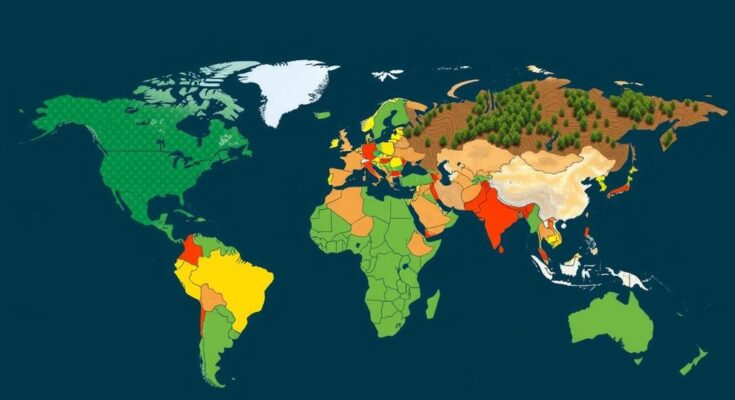Richer countries are initiating compensation for poorer nations experiencing climate change damages. Cyclone Freddy devastated Malawi, leading to significant displacement and hardship. A new funding model termed “loss and damage” aims to support recovery, with about $720 million pledged. However, experts warn that this funding is insufficient given escalating climate threats. Ongoing negotiations at COP29 seek to finalize the distribution and scope of aid necessary for affected nations.
In the wake of devastating climate events, richer nations are beginning to provide compensation to poorer countries for damages incurred due to climate change. One poignant example can be found in Malawi, where Cyclone Freddy resulted in severe flooding, displacing thousands of families, including that of Christopher Bingala, a subsistence farmer. After losing his home and livestock, Mr. Bingala received assistance in the form of approximately $750, enabling him to rebuild and relocate to a less vulnerable area. This compensation is part of a broader initiative termed “loss and damage” funding, designed to support countries that contribute minimally to global pollution yet face the harsh effects of climate change.
The global response to climate change has been inadequate, particularly in addressing the plight of low-income countries that suffer disproportionately from extreme weather events. Despite agreeing to a funding commitment exceeding $720 million last year, experts caution that this amount will be insufficient given the escalating frequency and severity of such disasters. At the ongoing COP29 climate summit in Baku, negotiations continue regarding the actual disbursement of these funds, with calls for wealthier nations to take responsibility for emission-related damages inflicted on developing nations.
Malawi alone faced a crisis with Cyclone Freddy, which resulted in the displacement of 650,000 individuals. Many displaced families experienced acute food shortages, forcing them to resort to dire measures for survival. The compensation paid to Mr. Bingala and other affected families was facilitated by GiveDirectly, a non-profit organization that specializes in unconditional cash transfers. This pilot program in Malawi aims to establish a more comprehensive funding system to assist those affected by climate-related losses globally. However, critical challenges remain, including the necessity for more extensive financial aid to cover not just immediate recovery but also long-term adaptation measures against climate threats.
As nations grapple with the realities of climate change, the financial implications for developing countries are becoming increasingly severe. Prime Minister Philip Davis of the Bahamas articulated the immediate concern: rebuilding after climate-induced disasters necessitates incurring national debt, which has become unsustainable. The anticipated need for loss and damage funding could exceed $250 billion annually by 2030, prompting a call for wealthier nations to provide support founded in enlightened self-interest, recognizing that the ramifications of climate inaction extend well beyond national borders. Such a proactive approach is essential to avert a future where displaced populations become climate refugees, destabilizing regions worldwide.
The initial establishment of a loss and damage compensation fund stems from the recognition that low-income countries often face the most severe consequences of climate change, despite contributing the least to greenhouse gas emissions. Cyclone Freddy serves as a case study illustrating the devastating impact of climate-related disasters on vulnerable populations. Recent international agreements during climate summits emphasize the necessity of financial support from wealthier nations to assist poorer nations in managing and recovering from such disasters.
Richer nations are beginning to acknowledge their financial responsibility to assist poorer countries affected by climate change, as demonstrated through the “loss and damage” compensation initiative. The experiences of individuals like Christopher Bingala underscore the critical need for effective funding mechanisms to support recovery efforts. As climate-related challenges intensify globally, the urgency for increased financial contributions from developed nations grows, both for humanitarian reasons and to cultivate stability in a rapidly changing world.
Original Source: www.keranews.org




